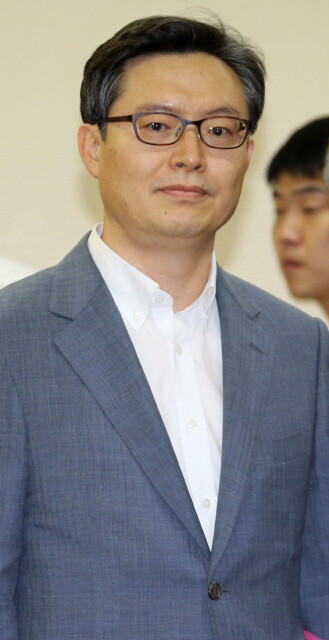hankyoreh
Links to other country sites 다른 나라 사이트 링크
Seoul suggests inter-Korean talks on N. Korea nuclear issue

After an agreement was reached in the “two-plus-two” high-level talks between South and North Korea, the South Korean government proposed holding nuclear negotiations with North Korea as a way to solve the North Korean nuclear issue.
“If both North and South Korea abide by the recent agreement and if the mood is right, this should have a positive effect on the nuclear issue. I hope that North and South Korea will soon be able to directly discuss the nuclear issue,” said Hwang Jun-guk on Aug. 28. Hwang is representative for Korean Peninsula Peace and Security Affairs for the Ministry of Foreign Affairs and South Korea’s envoy to the six-party talks.
“Improving inter-Korean relations and resolving the issue of North Korea’s nuclear programs should complement each other as part of a virtuous cycle,” Hwang emphasized.
Hwang was suggesting that the momentum resulting from an agreement between North and South to hold reunions for divided families and to promote civilian exchange should be used to create a deliberative framework for the nuclear issue.
North Korea has preferred to negotiate directly with the US about the nuclear issue, and many experts think there is little chance that North Korea would accept a proposal for bilateral nuclear negotiations with South Korea in any framework other than the six-party talks.
But before nuclear talks between the US and North Korea resumed briefly in 2011, the North and South Korean envoys to the six-party talks sat down for inter-Korean denuclearization talks. This suggests that it is not inconceivable for nuclear talks between North and South Korea to take place in a separate framework that is still linked to the six-party talks and bilateral negotiations between the US and North Korea.
In regard to relations between North Korea and China, Hwang said, “China will not side with North Korea’s provocations. This incident clearly showed the changes that have been taking place over the last few years in China’s relationships with North Korea and South Korea. Unlike the sinking of the Cheonan warship and the shelling of Yeonpyeong Island, China offered an official reaction that can be interpreted as a departure from its previous criticism of both sides.”
Hwang appears to be referring to comments by Hua Chunying, spokesperson for the Chinese Foreign Ministry. On Aug. 21, Hua said, “We urge the responsible party to be calm and exercise restraint, to resolve the present situation through dialogue and compromise, and to stop any actions that can increase tensions.”
Hwang is taking the phrase “the responsible party” to mean that China held North Korea responsible for the tensions. However, this expression alone is not enough to know which party North Korea was specifying. Some even suggest that China was calling on both North and South Korea to “be calm and exercise restraint.”
“The international community is watching closely to see whether North Korea will carry out another provocation on Oct. 10, the 70th anniversary of the foundation of the Korean Workers’ Party. If North Korea launches what it claims to be a satellite or makes some other kind of strategic provocation, the international community will put more pressure on North Korea, and North Korea will become even more isolated,” Hwang warned.
By Kim Oi-hyun, staff reporter
Please direct questions or comments to [english@hani.co.kr]
Editorial・opinion
![[Editorial] Does Yoon think the Korean public is wrong? [Editorial] Does Yoon think the Korean public is wrong?](https://flexible.img.hani.co.kr/flexible/normal/500/300/imgdb/original/2024/0417/8517133419684774.jpg) [Editorial] Does Yoon think the Korean public is wrong?
[Editorial] Does Yoon think the Korean public is wrong?![[Editorial] As it bolsters its alliance with US, Japan must be accountable for past [Editorial] As it bolsters its alliance with US, Japan must be accountable for past](https://flexible.img.hani.co.kr/flexible/normal/500/300/imgdb/original/2024/0417/6817133413968321.jpg) [Editorial] As it bolsters its alliance with US, Japan must be accountable for past
[Editorial] As it bolsters its alliance with US, Japan must be accountable for past- [Guest essay] Amending the Constitution is Yoon’s key to leaving office in public’s good graces
- [Editorial] 10 years on, lessons of Sewol tragedy must never be forgotten
- [Column] A death blow to Korea’s prosecutor politics
- [Correspondent’s column] The US and the end of Japanese pacifism
- [Guest essay] How Korea turned its trainee doctors into monsters
- [Guest essay] As someone who helped forge Seoul-Moscow ties, their status today troubles me
- [Editorial] Koreans sent a loud and clear message to Yoon
- [Column] In Korea’s midterm elections, it’s time for accountability
Most viewed articles
- 1Samsung barricades office as unionized workers strike for better conditions
- 2[Column] The clock is ticking for Korea’s first lady
- 3[Editorial] When the choice is kids or career, Korea will never overcome birth rate woes
- 4Why Israel isn’t hitting Iran with immediate retaliation
- 5[News analysis] After elections, prosecutorial reform will likely make legislative agenda
- 6S. Korea, Japan reaffirm commitment to strengthening trilateral ties with US
- 7Japan officially says compensation of Korean forced laborers isn’t its responsibility
- 8[Editorial] As it bolsters its alliance with US, Japan must be accountable for past
- 9[Editorial] Does Yoon think the Korean public is wrong?
- 10[Guest essay] How Korea turned its trainee doctors into monsters